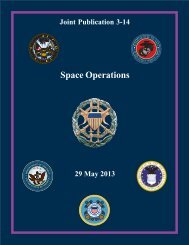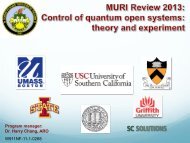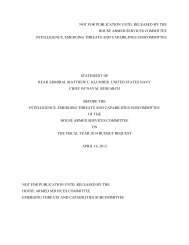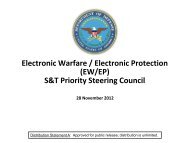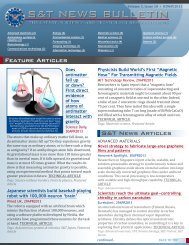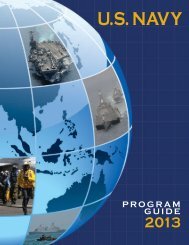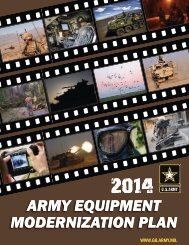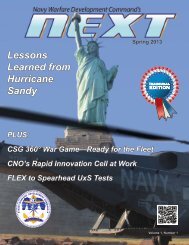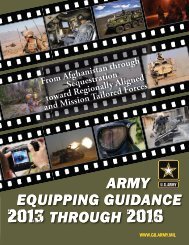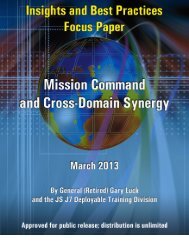JP 1, Doctrine for the Armed Forces of the United States - Defense ...
JP 1, Doctrine for the Armed Forces of the United States - Defense ...
JP 1, Doctrine for the Armed Forces of the United States - Defense ...
Create successful ePaper yourself
Turn your PDF publications into a flip-book with our unique Google optimized e-Paper software.
Chapter IV<br />
b. One Service Involved. Matters that involve only one Service should be handled by<br />
<strong>the</strong> Service component commander, subject to Service regulations. A Service member is<br />
vested with a hierarchy <strong>of</strong> rights. From greatest to least, <strong>the</strong>se are: <strong>the</strong> US Constitution, <strong>the</strong><br />
UCMJ, departmental regulations, Service regulations, and <strong>the</strong> common law. JFCs must<br />
ensure that an accused Service member’s rights are not abridged or trampled. National<br />
Guard members operating under Title 32, USC, or state active duty status are subject to <strong>the</strong>ir<br />
respective state’s jurisdiction.<br />
c. A commander’s UCMJ jurisdiction may extend over persons serving with or<br />
accompanying <strong>the</strong> <strong>Armed</strong> <strong>Forces</strong> <strong>of</strong> <strong>the</strong> <strong>United</strong> <strong>States</strong> during military operations in<br />
accordance with UCMJ Article 2 (Title 10, USC, Section 802). Criminal matters falling<br />
outside UCMJ jurisdiction may be managed under Title 18, USC, Sections 3261–3267 (also<br />
known as <strong>the</strong> Military Extraterritorial Jurisdiction Act).<br />
For fur<strong>the</strong>r in<strong>for</strong>mation on appropriate procedures <strong>for</strong> exercising criminal jurisdiction over<br />
civilians employed by or accompanying <strong>the</strong> <strong>for</strong>ce, see DODI 5525.11, Criminal Jurisdiction<br />
Over Civilians Employed By or Accompanying <strong>the</strong> <strong>Armed</strong> <strong>Forces</strong> Outside <strong>the</strong> <strong>United</strong> <strong>States</strong>,<br />
Certain Service Members, and Former Service Members.<br />
14. Trial and Punishment<br />
a. Convening Courts-Martial. General courts-martial may be convened by <strong>the</strong> CCDR.<br />
An accused may be tried by any courts-martial convened by a member <strong>of</strong> a different Service<br />
when <strong>the</strong> courts-martial is convened by a JFC who has been specifically empowered by<br />
statute, <strong>the</strong> President, SecDef, or a superior commander under <strong>the</strong> provisions <strong>of</strong> <strong>the</strong> RCM<br />
(201[e][2] <strong>of</strong> <strong>the</strong> MCM) to refer such cases <strong>for</strong> trial by courts-martial.<br />
b. Post-Trial and Appellate Processing. When a court-martial is convened by a JFC,<br />
<strong>the</strong> convening authority may take action on <strong>the</strong> sentence and <strong>the</strong> findings as authorized by<br />
<strong>the</strong> UCMJ and MCM. If <strong>the</strong> convening authority is unable to take action, <strong>the</strong> case will be<br />
<strong>for</strong>warded to an <strong>of</strong>ficer exercising general court-martial jurisdiction. Following convening<br />
authority action, <strong>the</strong> review and appeals procedures applicable to <strong>the</strong> accused’s Service will<br />
be followed.<br />
c. Nonjudicial Punishment. The JFC may impose nonjudicial punishment upon any<br />
military personnel <strong>of</strong> <strong>the</strong> command, unless such authority is limited or withheld by a superior<br />
commander. The JFC will use <strong>the</strong> regulations <strong>of</strong> <strong>the</strong> alleged <strong>of</strong>fender’s Service when<br />
conducting nonjudicial punishment proceedings, including punishment, suspension,<br />
mitigation, and filing. However, <strong>the</strong> JFC should normally allow nonjudicial punishment<br />
authority to be exercised by <strong>the</strong> appropriate Service component commander. Except as noted<br />
below, appeals and o<strong>the</strong>r actions involving review <strong>of</strong> nonjudicial punishment imposed by a<br />
JFC will follow <strong>the</strong> appropriate regulations <strong>of</strong> <strong>the</strong> alleged <strong>of</strong>fender’s Service. When <strong>the</strong><br />
CCDR personally imposes nonjudicial punishment, or is o<strong>the</strong>rwise disqualified from being<br />
<strong>the</strong> appellate authority, appeals will be <strong>for</strong>warded to <strong>the</strong> CJCS <strong>for</strong> appropriate action by<br />
SecDef or SecDef designee. Collateral decisions and processing (e.g., personnel and finance<br />
actions and unfavorable notations in selection records and personnel files) will be handled in<br />
Service channels.<br />
IV-20 <strong>JP</strong> 1



